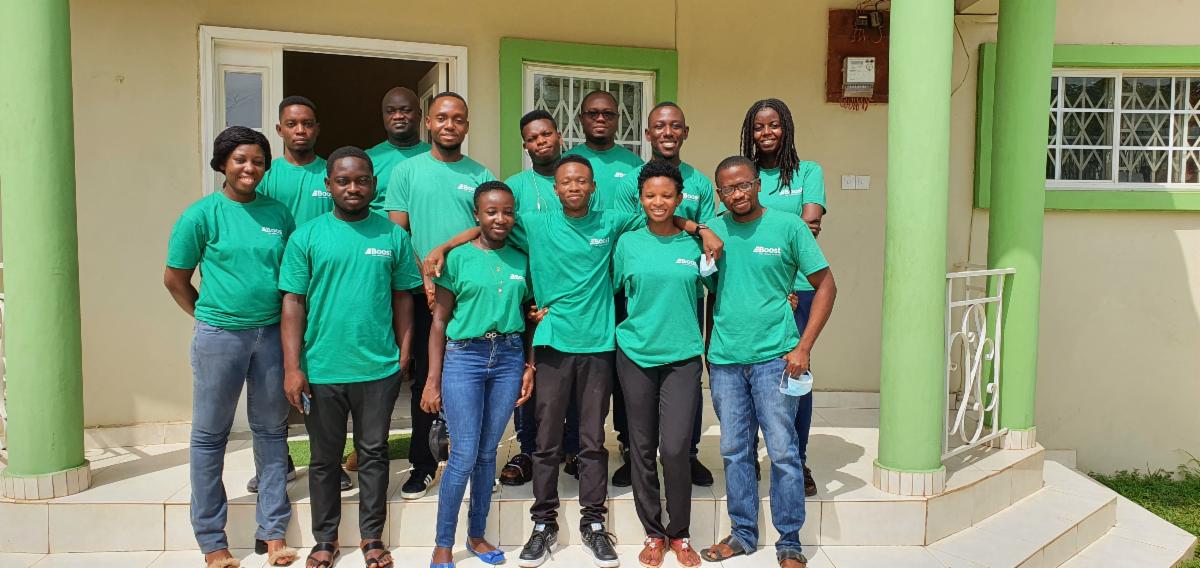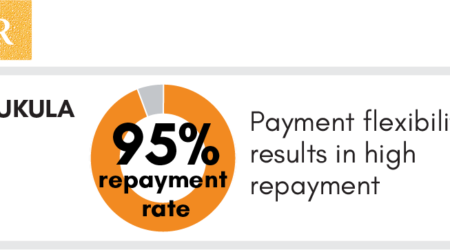Why we invested: Boost Ghana is bringing efficiency, digitization, and product depth to informal merchants

Business owners running a store or restaurant know that sales are only as successful as the products they have in stock. Keeping in-demand products on the shelf or on the menu is critical to success. However, the vast numbers of micro and small enterprises (MSEs) in Ghana’s retail and restaurant space face two challenges in doing so: extremely limited working capital and difficulty replenishing inventory frequently.
Most such merchants are informal and have the bulk of their capital tied up in inventory. When things don’t sell, they need to find a way to replenish the things that are moving so they can keep earning revenue. In these instances, restocking in-demand items frequently can help. However, merchants in Ghana often go to the main market to restock, requiring them to close down for several hours. Needless to say, every minute the store is closed or an item remains out of stock represents a potential lost sale, and every cent matters for these businesses’ bottom lines.
Boost Ghana, a franchise of Boost Technology, aims to solve these problems by providing a digital platform that offers merchants convenient stock ordering and delivery. Instead of going to the market to purchase supplies, merchants register for a Boost Ghana account and then order products through their mobile phones (or by calling them in for low literacy and non-smartphone customers). Once they place an order, Boost Ghana will deliver the items directly to their stores or restaurants.
Merchants have already responded positively to Boost Ghana’s offering. Boost Ghana piloted its platform in early 2020 with primarily women-owned grocery stores in Accra, and is now supplying the majority of stock for their growing customer base.
Impact
MSEs dominate the Ghanaian economy, representing 80% of the MSME sector and employing over 50% of Ghanaians. 80% of these MSEs purchase their inventory in person, which means the vast majority faces additional costs and lost sales due to time spent commuting to and from the markets to restock.
One way to save on such costs would be to buy in bulk, yet small business owners have limited working capital, the bulk of which is tied up in stock. As such, while merchants want to buy in bulk to access lower prices per item and augment their profit margins, they rarely have the capital to do so and worry about tying up too much in inventory that may not sell. As a result, these shops lack product depth (many units of a given product) and must frequently close up shop to replenish supplies.
The Boost Ghana stock ordering platform solves these problems by providing regular, low-cost delivery directly to merchants so that they can restock on their mobiles without leaving their store. Via the platform, Boost Ghana is able to provide shopkeepers with a range of fairly priced inventory that is delivered to their door. That means shopkeepers have products in stock when customers want them, and can restock easily and conveniently.
By helping merchants grow and document their transactions and purchases, Boost Ghana also contributes to a broader development priority: to digitize the economy. Although Ghana boasts 39% mobile money adoption, B2B supply chains in Ghana still primarily transact in cash. Boost Ghana is driving the digital transformation of retailers by making it easy to order goods online and make digital payments via bank deposits or mobile money, while keeping a digital record of their order history.
In addition, Boost Ghana’s order and payment records formalize procurement and give entrepreneurs a documented ledger of their order and payment history that could eventually serve as formal accounts from the perspective of regulators and lenders.
Innovation
Boost Ghana serves customers in the ways they are most comfortable and meets them at their level of technological readiness. Rather than creating a tech-heavy, text-heavy app, Boost Ghana has leveraged digital tools that merchants already know and use. For instance, the platform is a lightweight, interactive catalog that can be accessed by smartphone.
Ghana has the highest mobile penetration rate in West Africa (55%) and falls only behind South Africa in sub-Saharan Africa with regards to mobile adoption. Catalyst Fund research evaluating how informal retailers in urban and peri-urban Accra use digital commerce today found that the large majority of retail store owners with a fixed locale had a smartphone and active mobile subscription.
It also found that much digital commerce taking place in Ghana today occurs on social platforms such as WhatsApp; WhatsApp is the most active platform in Ghana, used by 30% of the population. 72% of the MSEs we interviewed used WhatsApp to take orders from their customers. We also found that 85% advertise their products on social media, including WhatsApp, and that it is not uncommon for interactions between customers and shop owners to take place entirely in the app. Usage of social media platforms is growing as a whole: Ghana gained over 2.2 million social media users in the past year, a 36.7% increase. Fintech innovators that are able to leverage these existing behaviors find greater levels of adoption, stickiness and usage.
One other area of innovation for Boost Ghana is access to data at the last mile. Boost Ghana hopes to leverage their purchasing data with last-mile merchants to identify and monetize demand trends. Such market intelligence will be invaluable for Boost Ghana, its customers, and other third parties, especially FMCG manufacturers and distributors who may be interested in the types of products that are popular among Ghanaians, including when customers purchase and in what combinations. In today’s retail and supply value chain, FMCG companies do not have visibility into real-time or granular data about end-customer consumption patterns, which are the kind of downstream insights that Boost Ghana could deliver as it digitizes merchants’ order histories.
Growth potential
Boost Ghana has already demonstrated impressive growth potential, having more than doubled across every available metric in the past year.
There is plenty of opportunity to attract more customers, too. There are over two million MSEs in Ghana (MITA), along with another 100,000 medium-sized businesses. Boost Ghana’s platform solves a major issue for these enterprises by eliminating their need to travel to market and purchase stock.
Boost Ghana has massive potential to serve Ghana’s vital economy and grow into a scalable business that enables more informal MSEs to leverage digital commerce, which will help them to grow. Boost Ghana is a franchise of Boost Technology, which is also operational in South Africa and Nigeria, and quickly expanding across Africa.
ACCESS OUR DIGITAL COMMERCE DATABASE IN GHANA
The Catalyst Fund model delivers outsized success compared with other accelerator programs. We accelerate startups that excel on three fronts:
- Impact: Catalyst Fund startups deliver (or, in the case of B2B firms, facilitate the delivery) of life-changing products and services to underserved populations. These can include financial services like loans, savings, insurance, and investment, but also access to productive inputs or essential services such as energy, sanitation, and water.
- Innovation: Our startups are pioneering game-changers that are innovating new products and business models. They drive the sector forward by demonstration effect and via the learning that Catalyst Fund documents and shares.
- Growth potential: Catalyst Fund startups are distinctively investment-worthy, developing businesses that are scalable, with high growth potential. Our startups are selected by an Investor Advisory Committee, who have deep experience in emerging markets and nominate high-potential startups, and then sponsor and mentor them through Catalyst Fund. As a result, our startups raise more funding than startups from other accelerators.


